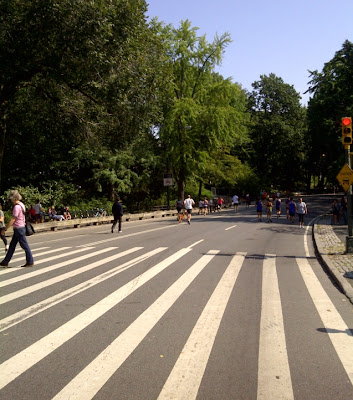Improve Your Gas Mileage 30% By "Coasting"
Ok, it's a little off topic compared to what's usually on the blog, but lots of people are venturing out of the city on weekends, and everyone is feeling the pinch at the pump when they do so. I have long argued with friends and family about how driving technique can have a big impact on gas mileage. So, this weekend, I took my late model SUV (I know, a poor choice) to the Hamptons and back and took careful note of my gas mileage by on board computer and I carefully watched my driving style. What I found was that over 250 miles of driving in urban, rural, and city locales, my mileage was 30% higher than the manufacturer stated. My vehicle is estimated at 14mpg city, 20 mpg highway, and 16 mpg combined. My results, 17mpg city, 26mpg highway and combined, close to 21 mpg. How did I do it? It's called "Coasting".
"Coasting" is a technique that goes to various extremes to conserve gas and limits stops and starts. Some who have adopted the technique go to the dangerous extreme of turning off the engine, or shifting into neutral after they have achieved a sustainable speed. I'd never do that, but I have managed to resist the urge to "punch it" when maneuvering on the highway. Here is how I conserve through coasting:
1- Rather than blasting the gas pedal to speed up (hitting 7000rpm), I go for a more gradual speed up (2000-3000rpm) to get up to my desired speed.
2- I leave a fair amount of distance between my car and the car ahead of me. This allows me to lay off the gas pedal and coast when someone is braking in front of me. Usually the car ahead will pick up speed before I have to hit the brakes.
3- On downhill stretches I see how far I can go maintaining speed without hitting the gas. When I do have to hit the gas, I do it gradually.
I have found the technique to be easy on both gas and the breaks. Over 250 miles, I managed to save almost 4 gallons of gas, and at $4.29 a gallon out East, that adds up quickly.
"Coasting" is a technique that goes to various extremes to conserve gas and limits stops and starts. Some who have adopted the technique go to the dangerous extreme of turning off the engine, or shifting into neutral after they have achieved a sustainable speed. I'd never do that, but I have managed to resist the urge to "punch it" when maneuvering on the highway. Here is how I conserve through coasting:
1- Rather than blasting the gas pedal to speed up (hitting 7000rpm), I go for a more gradual speed up (2000-3000rpm) to get up to my desired speed.
2- I leave a fair amount of distance between my car and the car ahead of me. This allows me to lay off the gas pedal and coast when someone is braking in front of me. Usually the car ahead will pick up speed before I have to hit the brakes.
3- On downhill stretches I see how far I can go maintaining speed without hitting the gas. When I do have to hit the gas, I do it gradually.
I have found the technique to be easy on both gas and the breaks. Over 250 miles, I managed to save almost 4 gallons of gas, and at $4.29 a gallon out East, that adds up quickly.


I've been driving using coasting as long as I can remember. My breaks go much longer than normal between service too. On my 2003 Honda Civic hybrid, I've had one set of brake pads replaced at around 90K and not needed a brake job since. It's got 195K now.
ReplyDeleteAll my previous vehicles have been 5 speed manuals and when coasting to a stop I hardly ever down shifted, as just before you come to a complete stop there is a moment when if you apply a little pressure on the shifter it just slips into neutral without any resistance. The thinking here is that it's a lot cheaper to replace brake pads than repairing your clutch.
Another way to improve your mileage by around %15 is to drive60 on long trips and commutes with light traffic, see www.drive60.com There's a Euro style oval decal too.
I agree with you here Andrew. I will link to this article from mine. I do an auto blog at TheTestdriver.com
ReplyDeleteThanks,
BC